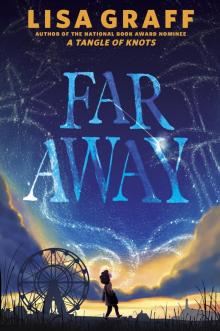- Home
- Lisa Graff
The Great Treehouse War Page 2
The Great Treehouse War Read online
Page 2
Winnie opened the mini fridge and pulled out a carton of milk. From the cupboard above the sink, she grabbed a green bowl, a spoon, and a box of Froot Loops, and then she sat down at the small round table. Buttons settled himself on top of the table, like a fluffy kitty king. There was no oven or stove in the treehouse, since Uncle Huck had been worried about Winnie setting the linden on fire (what with Winnie being only eleven and everything). But there was a toaster oven and an electric teakettle, which Winnie mainly used for making hot cocoa.
Winnie shook the last of the Froot Loops from the box and wolfed them down, then pushed the bowl to Buttons, who lapped up the speckly milk. After finishing their snack, Winnie and Buttons checked the “mailbox.”
The mailbox was really a large platform that Uncle Huck had rigged to a pulley. If someone left Winnie a letter or a package, they’d push a button that lit the red lightbulb near Winnie’s kitchen window. Then all Winnie had to do was open the window and haul the platform up. Uncle Huck often left Winnie a treat or two on Wednesday afternoons—a cooler of lemonade for her fridge, or a couple of ham sandwiches for her and Buttons (Buttons was awfully fond of ham sandwiches). That afternoon, there was a fresh box of Froot Loops and a brand-new sketchbook. Winnie hugged the sketchbook to her chest and took a whiff of its fresh-paper smell. Somehow Uncle Huck always seemed to know exactly what she needed, even before she thought of it herself.
For a moment, Winnie considered climbing out the window and onto the roof, where Uncle Huck had installed a two-way zip line that ran directly between her treehouse and his home, one block away. It would be the fastest way to drop in and say thanks. But in the end she decided against it. Thinking it was a nothing-special Wednesday, Winnie decided to do all the nothing-special things she normally did (which were really kind of special, after all).
As far as Winnie was concerned, the only problem with Wednesdays was that there was only one of them a week. Which made it super difficult to figure out how to fill that day up. That Wednesday, for example, Winnie had doodling to do and hot cocoa to make and the world’s greatest cat to snuggle. She also had a week’s worth of homework to catch up on and tests to study for and an entire book to read for a book report. Not to mention that she really ought to figure out an amazing present for Squizzy’s birthday the next day and sort through all her swimsuits to find the perfect one for Lyle’s pool party in June. On nothing-special Wednesdays, Winnie often ended up doing the sorts of things that most kids could do any old day of the week.
At first, dividing her days between her parents had worked perfectly. Spending exactly equal time with each parent meant that Winnie only had to be around one of them at once, which was good for everyone, because whenever her parents were in the same room together, they always found some way to drive Winnie crazy. (One time, at the Parents’ Night Concert, Winnie’s dad was seated two rows farther back from the stage than Winnie’s mom, and he made such a stink that Greta’s great-grandma finally switched with him.) So at first, the “very sensible plan” Winnie’s parents had thought up seemed like a total success.
And then Winnie’s mom remembered about Thanksgiving.
Before the divorce, no one in Winnie’s family had ever cared about most holidays, like Easter or Hanukkah or Diwali. The only one they celebrated at all was Thanksgiving. Before the divorce, they always had a huge family feast. Winnie’s mom would make turkey and cranberries and four kinds of potatoes, and Winnie’s dad would prepare sausage stuffing completely from scratch. Uncle Huck brought his famous blackberry pie—Winnie’s favorite dessert on the planet—and they’d spend the day talking and toasting and telling stories and stuffing themselves silly. Back then, Winnie figured that if you were only going to celebrate one holiday a year, Thanksgiving was a good one to pick.
So maybe it shouldn’t have been too surprising that when Winnie’s mom realized she was never going to celebrate Thanksgiving with her daughter again (because of Winnie’s dad always having Thursdays, because of Winnie’s parents’ “very sensible plan”), she decided to pick a new holiday to celebrate and to make it even better than Thanksgiving. To make Winnie “forget all about that silly dinner with your father.”
The holiday Winnie’s mom picked was Flag Day.
Winnie’s mom didn’t ask Winnie if she wanted to celebrate Flag Day. Instead, she packed her daughter in the car that Tuesday afternoon and drove her to the local dedication ceremony of the new flag retirement box outside the sheriff’s office. (The ceremony was about as boring as that last sentence.)
“Isn’t this just as much fun as Thanksgiving?” her mom asked her when they were back at the house, designing their own flags and sporting silly bonnets like Betsy Ross.
Winnie could tell that it was important to her mom that Flag Day be a super-incredible holiday. And really, Winnie figured, what did it hurt to lie a little, just to make her mom happy? So she told her, “Yeah, Mom. Flag Day is amazing. Even better than Thanksgiving.”
Well.
Maybe Winnie should’ve known. Maybe she should’ve predicted that her mom would call her dad and brag that she’d found a holiday to celebrate with their daughter that was even more stupendous than the one he was stuck with. Maybe Winnie should have figured that, once her dad heard the news, he’d devote weeks of his life to researching little-known holidays online so that he could one-up Winnie’s mom. Maybe Winnie should have imagined that just a few Saturdays later, she’d be spending an evening in her dad’s backyard, camping out in sleeping bags and peering through binoculars for signs of extraterrestrial life, to celebrate World UFO Day.
And, okay, World UFO Day was actually pretty fun. Winnie and her dad snacked on space ice cream and made up their own goofy alien language. They played Ultimate UFO Frisbee and stayed up late into the evening, watching the stars.
The problem was that Winnie’s mom saw them celebrating World UFO Day from the window of her den. (Winnie would later wonder if her dad had secretly planned on that happening all along.) Which, of course, led Winnie’s mom to research more unique holidays of her own.
And that’s when things really started to get bonkers.
Some of the holidays Winnie and her mom celebrated were awesome, like Ice Cream Sandwich Day.
Some of the holidays were . . . unusual, like Cow Appreciation Day.
And some of the holidays were ones Winnie wished she had never, ever heard of, like Underwear Day.
Winnie did her best to keep the new holidays a secret from her dad, but he found out anyway. (Winnie would later wonder if her mom didn’t specifically plan a parade for Lasagna Day in order to rub her dad’s face in their party.) So before long, Winnie was observing even more obscure holidays with her father.
Sand Castle Day.
Bad Poetry Day.
Burger Day.
The more holidays her dad found, the more her mom did.
The more holidays her mom found, the more her dad did.
When Winnie’s mom took her to the boardwalk for a blowout Roller Coaster Day bash, Winnie’s father responded with a full-on fiesta for Take Your Cat to the Vet Day. (Buttons wasn’t too excited about that one.) By the time Winnie started fifth grade at Tulip Street Elementary, she was celebrating a holiday every day of the week—except, of course, on Wednesdays. And it wasn’t that Winnie didn’t like holidays. But tossing hundreds of Slinkies down the stairwell over and over for National Slinky Day meant that there was very little time left in Winnie’s afternoon to do anything else. Her parents were so focused on making sure that every single day they spent with their daughter was better than any day she spent with her other parent, that Winnie never had a spare second to doodle in her sketchbook or hang out with her friends or even finish her homework.
Except of course on Wednesdays.
So that Wednesday, the nothing-special Wednesday, Winnie did exactly what she wanted. She snagged some supplies from her art station (whe
re there was an easel and tons of paper and paintbrushes and pipe cleaners and pretty much every art supply you could think of), walked by the “lounging area” with the daybed and the teeny-tiny bathroom, and climbed the steps to the second-floor loft. There she flopped down on her giant beanbag bed and opened up her new sketchbook from Uncle Huck. The book’s unlined pages seemed full of possibility, inviting Winnie to draw any doodle she wanted or tell any story that popped into her brain. Buttons scrambled up his cat jungle gym to snuggle in beside her, and together they spent that Wednesday afternoon thinking and doodling and staring out the window and really doing nothing special at all.
When the sky outside grew dark and the air grew still, Winnie and Buttons tucked themselves under the soft, ratty quilt that had once been her baby blanket, and Winnie set the sketchbook full of brand-new, nothing-special doodles on the nearby shelf. They gazed out the skylight above them, watching the leaves and the stars and the world, keeping each other company in comfortable quiet.
Maybe, if Winnie had known what was about to happen, she would have stayed awake a little longer, breathing in the nothing-special treehouse smell, listening to the soft chirp of the nothing-special crickets outside. But she didn’t. So instead she drifted off into a perfectly lovely, nothing-special sleep.
Visit http://bit.ly/2h8F6Qx for a larger version of this image.
Grim Grades
1 day before what happened happened
Winnie felt a squirm in her stomach as the rest of her classmates headed to the cafeteria that Thursday afternoon. She stayed behind at her desk, wishing Buttons, the world’s greatest cat, were there to snuggle her. She knew that whatever Mr. Benetto wanted to talk to her about wasn’t going to be anything good.
Just before the door to Room 5L swung shut, Lyle poked his head back inside to check on her. You okay? he asked Winnie with his eyebrows. She gave him a maybe . . . we’ll see shoulder shrug.
“Winnie,” Mr. B said the instant the door was closed. He perched himself on the edge of his desk, which was only one row away from Winnie’s—not nearly far enough. “Is everything all right at home?”
Winnie wasn’t entirely sure how to answer that question. Technically, everything at home was fine. Her parents were weird, but what was new about that? And everything in her treehouse was even better.
Winnie shrugged.
“I’m asking,” Mr. B went on, tapping his fingers on the edge of his desk, “because you’ve been doing very poorly on all of your assignments and tests, for quite some time now.”
“I’m sorry about the book report,” Winnie cut in quickly. “I should’ve spent more time on it. I . . .” The truth was, Winnie had had time for the book report, the night before, during what she’d thought was a nothing-special Wednesday in her treehouse. She could have read The Trumpet of the Swan. She could have written the entire book report that night, instead of banging out a few words about barbershop quartets on the library computer during first recess. But Wednesdays were the only days Winnie had to herself. She’d wanted to doodle in her brand-new sketchbook. She’d wanted to snuggle Buttons and fall asleep watching the stars. She had not wanted to read about swans. “I’m sorry,” she finished lamely.
Mr. B frowned. “It’s not simply the book report,” he told her. “You’re a smart kid, Winnie. And I’ve talked to your previous teachers, and I know that you used to receive excellent grades. But this year—”
“I’ll try harder,” Winnie said quickly. She felt miserable. She wanted Buttons more than ever in that moment, even if it would be weird to snuggle a cat at her desk. “Maybe you could make more of the tests be on Thursdays? Then I’d have lots more time to study.”
“I’m just . . . worried about you, Winnie,” Mr. B said. “And your parents . . .” His frown grew much deeper. “I’ve tried to talk to them, but I haven’t gotten anywhere.”
“Yeah,” Winnie said. “They can be, um, difficult.”
Mr. B studied her for a moment, like he was trying to figure out everything about her just from her face. Winnie tried to look as normal as possible. Finally, Mr. B clapped his hands together.
“I’m going to be frank with you, Winnie.” Winnie sat up a little straighter in her desk. “Your grades are not good.”
Winnie allowed herself a little slouch. That news wasn’t surprising at all. What with all the time she’d spent celebrating International Tongue Twister Day and Sled Dog Day and Flossing Day, she’d hardly had time to study for a single test all year.
“In fact,” Mr. B went on, “you’re in serious danger of failing fifth grade.”
At that news, Winnie nearly shot out of her desk. “Failing?” she squeaked. That was a surprise.
“As a matter of fact, yes,” Mr. B said. “Normally this would be a conversation I’d have with your parents, but as I said, they’ve proved . . . less cooperative than one might like. So I’m telling you, Winnie. We have one more major project coming up before the end of the school year—the local history report. It’s your last chance to boost your grades enough to graduate.”
What would happen, Winnie wondered, if she didn’t pass fifth grade? Would she be forced to stay in Mr. B’s class another year, while all her friends went off to middle school without her? And what if she failed again after that? Would she be doomed to repeat fifth grade over and over and over, until she was the oldest kid who’d ever gone to Tulip Street Elementary?
“Winnie?” Mr. B said. “Are you listening?”
Winnie snapped back into the conversation. “Um . . . ,” she started, but thankfully Mr. B repeated himself.
“Your local history report,” he said. “It’s due at the end of the month. That’s a little over two weeks from now. If you can manage a good grade on that—I’m talking an A, A-minus, minimum—you’ll be off to middle school without any further word from me.”
“Oh.” Winnie gulped. One report. She could do that. One report was no big deal, right? “Okay,” she said.
“Good. And, Winnie? Your parents . . . I mean . . .” Mr. B studied Winnie’s face again. “Is everything entirely . . . ?”
Winnie decided there was no point trying to explain her parents, so instead she said, “I’ll ace the history report. I promise.”
“Glad to hear it,” Mr. B said, finishing up his face-studying. “I’m expecting something great, though, you understand? You’ll need to work on it every day until it’s due.”
“Right,” Winnie said. “Every day. Sure thing.” She tried not to worry about whether or not that would be possible. There was too much rolling around in her brain already. “Can I go to lunch now?” she asked.
“Of course.”
And with that, Winnie left to join her friends in the cafeteria.
To:
[email protected];
[email protected]
From:
[email protected]
Date:
Thursday, April 13th
Subject:
your daughter’s grades
Dear Dr. Maraj and Dr. Malladi,
I’ve tried numerous times to call each of you with no success in scheduling a meeting; I’m hoping this email with do the trick. It is crucial that the two of you come in to meet with me for a parent-teacher conference regarding your daughter’s grades and her future. I cannot stress enough that Winnie is in danger of failing the fifth grade. I’ve just had a talk with Winnie herself, and I believe that she understands the situation—I must say I’m deeply concerned that neither of you seem as worried.
Please do be in touch ASAP about a time when we can all meet to discuss this very serious matter.
Sincerely,
Hector Benetto
To:
[email protected]
From:
[email protected]
Date:
Thursday, April 13th
Subject:
RE: your daughter’s grades
Dear Mr. Benetto,
As I stated on the phone the last four times you called, I’m happy to come into the school to talk about Winifred, but not if you keep inviting her father as well. I do wish you’d stop involving him in these matters. I take Winifred’s well-being very seriously, unlike SOME parents I could name.
Best wishes,
Alexis Maraj
To:
[email protected]
From:
[email protected]
Date:
Thursday, April 13th
Subject:
RE: your daughter’s grades
Dear Mr. Benetto:
Why do you always insist on addressing Winifred’s mother first in all of your correspondence? You do realize that I’ve won at least six more awards than she has, don’t you?

 Far Away
Far Away The Life and Crimes of Bernetta Wallflower
The Life and Crimes of Bernetta Wallflower The Great Treehouse War
The Great Treehouse War A Tangle of Knots
A Tangle of Knots Sophie Simon Solves Them All
Sophie Simon Solves Them All A Clatter of Jars
A Clatter of Jars Double Dog Dare
Double Dog Dare Umbrella Summer
Umbrella Summer Absolutely Almost
Absolutely Almost Lost in the Sun
Lost in the Sun